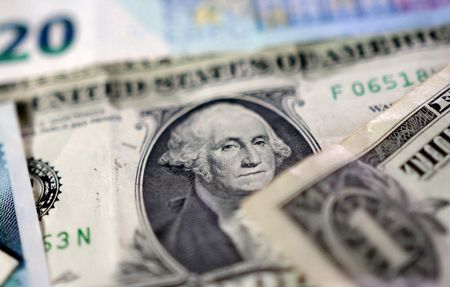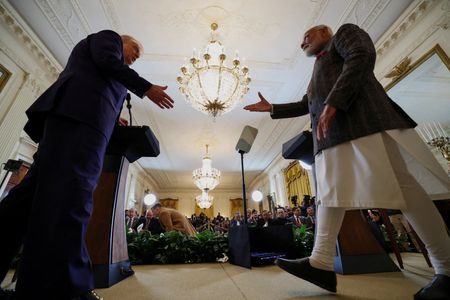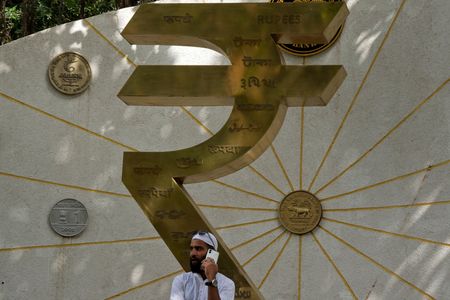By Rae Wee
SINGAPORE (Reuters) -The dollar weakened on Wednesday after a tame reading on U.S. inflation bolstered expectations of a Federal Reserve rate cut next month, with President Donald Trump’s attempts to extend his grip over U.S. institutions also undermining the currency.
U.S. consumer prices increased marginally in July, data showed on Tuesday, in line with forecasts and as the pass-through from Trump’s sweeping tariffs to goods prices has so far been limited.
Investors eyeing imminent Fed cuts cheered the data and moved to price in a 98% chance the central bank would ease rates next month, which in turn dragged on the dollar.
The euro was last up 0.1% to $1.1684, having risen 0.5% in the previous session. Against the yen, the dollar edged 0.07% higher to 147.95.
The dollar index dipped to 98.02, extending its 0.5% fall on Tuesday.
“The July CPI report showed less evidence of tariff pass-through to consumer prices … (but) I think a September rate cut is less than certain, probably not as certain as current market pricing,” said Carol Kong, a currency strategist at Commonwealth Bank of Australia.
“As the last payroll shows, one report can be sufficient to move the policy debate to one side or another. So I think we still have to wait (for) the remaining data to print before making a strong case about a rate cut or an on hold decision.”
U.S. Treasury yields similarly fell on the heightened rate cut expectations, with the two-year yield last at 3.7348%, having swung in a range of nearly 10 basis points on Tuesday.
The benchmark 10-year yield eased about 1 basis point to 4.2829%. [US/]
Also eroding investor confidence in the dollar were fresh attempts by Trump to undermine Fed independence, after White House spokeswoman Karoline Leavitt said on Tuesday that the U.S. president was considering a lawsuit against Fed Chair Jerome Powell in relation to his management of renovations at the central bank’s Washington headquarters.
Trump has been at loggerheads with Powell and has repeatedly lambasted the Fed chair for not easing rates sooner.
The president also hit out at Goldman Sachs CEO David Solomon, saying the bank had been wrong to predict U.S. tariffs would hurt the economy. Trump questioned whether Solomon should lead the Wall Street institution.
Elsewhere, sterling gained 0.03% to $1.3505.
Britain’s jobs market weakened again though wage growth stayed strong, according to data on Tuesday, underscoring why the Bank of England is so cautious about cutting interest rates.
The Australian dollar was up 0.03% to $0.6531, while the New Zealand dollar gained 0.05% to $0.5957.
The Reserve Bank of Australia on Tuesday cut interest rates as expected, and signalled further policy easing might be needed to meet its inflation and employment goals as the economy lost some momentum.
In cryptocurrencies, bitcoin halted its rally towards a fresh record and last traded 0.7% lower at $119,337.25, while ether scaled a nearly four-year high of $4,679.47.
“Ethereum’s quiet breakout is being fueled by real-world adoption and capital confidence,” said Gracie Lin, Singapore CEO of crypto exchange OKX.
“On our platform, ETH has now overtaken BTC as the most traded asset over the past month.”
(Reporting by Rae Wee; Editing by Jacqueline Wong and Jamie Freed)











